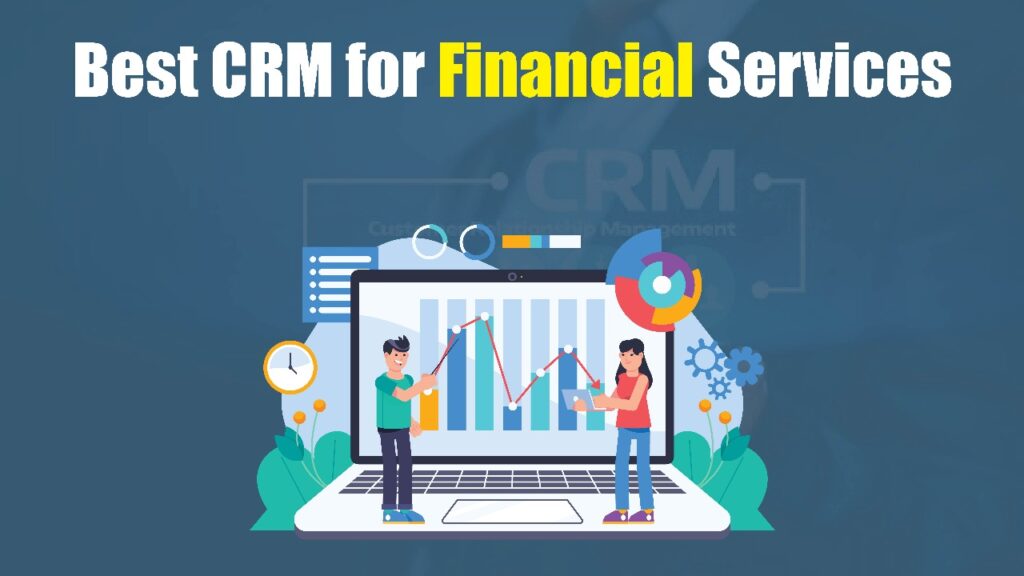Imagine this: you’re a financial advisor, banker, or wealth manager, juggling hundreds of client relationships, investment proposals, compliance requirements, and growing demands for hyper-personalized service.
In this world, a single misplaced client detail or delayed follow-up can mean a lost deal — or worse, a compliance risk. Traditional CRMs don’t cut it anymore, because they weren’t built with financial services pain points in mind.
Enter the financial-services-optimized CRM — a system that doesn’t just track leads, but maps client portfolios, supports regulatory workflows, integrates with financial planning tools, and empowers you with predictive analytics. In 2025, the right CRM doesn’t just manage clients — it transforms how financial institutions engage, retain, and grow their customer relationships.
This guide dives deep into why your financial services firm must adopt a purpose-built CRM + what to look for + the top 10 CRMs dominating the financial services space today.
Why Financial Services Firms Need a Specialized CRM
Financial services is not your standard “sell-and-forget” business — it’s a relationship-first, compliance-heavy, and data-critical sector. Here are a few reasons why general CRMs often fall short:
- Complex Client Lifecycles: Clients in finance go through onboarding, risk profiling, investment planning, regular reviews, compliance checks, and reporting.
- Regulatory Demands: Firms need to store audit trails, record client communications, and document advice for future regulatory scrutiny.
- Data Integration: CRMs must pull in data from portfolio platforms, custodians, financial planning tools, and more — and unify it.
- Forecasting & Analytics: Predictive analytics help advisors anticipate client needs (e.g., risk rebalancing, planning for life changes).
- Personalization: High-net-worth clients expect tailored advice, proactive outreach, and high-touch service delivered through digital channels.
Without a CRM designed for these nuances, financial firms risk client dissatisfaction, inefficiency, and compliance gaps.
Key Criteria for Choosing the Best Financial Services CRM
When shopping for a CRM in the financial services domain, you should evaluate based on these essential factors:
- Regulatory Compliance Features: Audit logs, data retention, secure notes, and permission controls.
- Financial Data Integration: Ability to connect with portfolio management systems, accounting tools, and financial planning software.
- Sales & Advice Workflow: Lead-to-client pipelines, opportunity tracking, and proposal generation tailored for advisory services.
- Analytics & Reporting: Forecasting, client segmentation, and performance dashboards to monitor advisor activity and client health.
- Automation & Follow-up: Automated reminders, personalized drip campaigns, and task automation for advisors.
- Security: Strong encryption, role-based access, and compliance with financial data regulations (e.g., GDPR, FINRA, SEC).
- Scalability & Customization: Custom fields, entity models (accounts, households), and flexibility to grow with the firm.
Why Choosing the Right CRM Defines Your Success in Financial Services
In the financial services industry, trust is currency, and every interaction with a client shapes your long-term reputation. This is why the CRM you choose can either become your biggest competitive advantage—or your biggest bottleneck. A powerful financial-focused CRM does more than store contacts; it helps advisors build deeper relationships, automate time-consuming workflows, ensure compliance with industry regulations, and deliver personalized client experiences at scale.
Today’s clients expect seamless communication, transparency, and proactive insights. Only a purpose-built CRM can help financial professionals live up to these expectations by integrating data, eliminating repetitive tasks, and empowering advisors to focus on high-value decisions instead of administrative work.
What This Means for You
A well-chosen CRM becomes:
- Your relationship management engine
- Your compliance safeguard
- Your growth accelerator
-
Your daily operational backbone
Who Benefits the Most
- Financial Advisors needing detailed client profiles and automated workflows
- Wealth Management Firms managing diversified portfolios
- Insurance Agencies tracking lead pipelines and renewals
- Banks & Lending Institutions requiring strict KYC and documentation compliance
- Investment Firms monitoring client interactions and performance trends
Top 10 Best CRM for Financial Services in 2026
- Microsoft Dynamics 365 – A powerful, enterprise-grade CRM offering deep automation, AI insights, and end-to-end financial service customization.
- Salesforce Financial Services Cloud – Industry-leading CRM built specifically for wealth management, banking, and insurance workflows with unmatched analytics.
- Redtail CRM – A popular and easy-to-use CRM designed for financial advisors with strong compliance tools and client management features.
- Wealthbox CRM – A modern, intuitive CRM ideal for financial planners who want simple workflows, collaboration tools, and seamless integrations.
- Junxure (AdvisorEngine CRM) – A robust advisor-focused CRM with advanced workflow automation and compliance-ready documentation tools.
- Zoho CRM – A flexible and cost-effective CRM offering customizable modules and automation features suitable for financial teams of all sizes.
- HubSpot CRM – A beginner-friendly yet powerful CRM that helps financial professionals manage pipelines, automate marketing, and boost client engagement.
- AdvisorEngine CRM – A comprehensive wealth-management platform offering CRM capabilities, client portals, and integrated portfolio tools.
- Pardot by Salesforce – A premium marketing automation platform for financial institutions looking to nurture leads and deliver personalized campaigns.
-
BusinessNext CRM– A growing financial services CRM focused on workflow automation, client lifecycle tracking, and secure documentation management.
1. Microsoft Dynamics 365
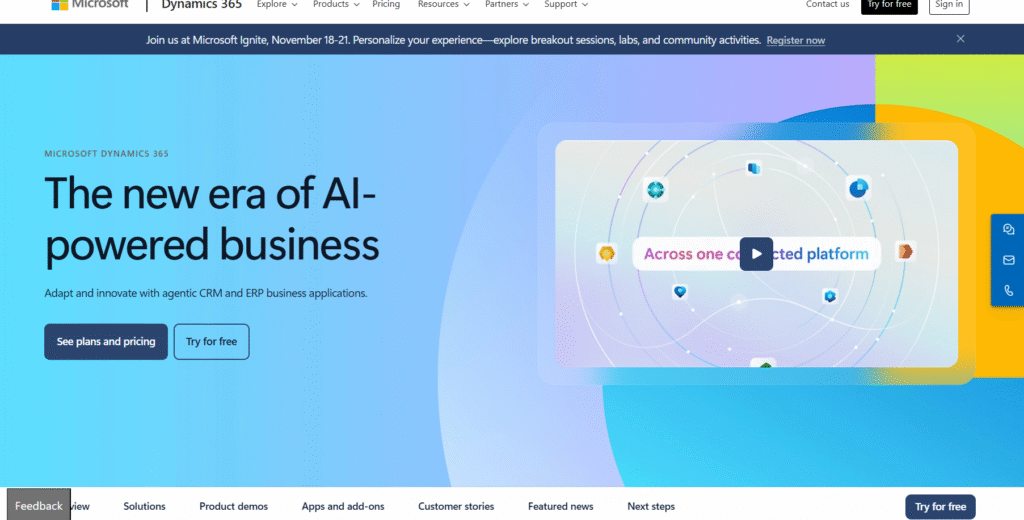
Overview
Microsoft Dynamics 365 is a comprehensive, enterprise-grade CRM designed for financial institutions that need strong automation, AI-driven insights, and deep customization. It integrates seamlessly with Microsoft’s ecosystem—Excel, Teams, Power BI, SharePoint—making it ideal for banks, insurance companies, wealth managers, and financial advisory firms. From client onboarding to relationship management and predictive forecasting, Dynamics 365 brings together everything financial professionals need in one unified system.
Key Features
- AI-based client insights and predictive analytics
- Integrated financial dashboards and reporting tools
- Automated workflows for onboarding and compliance
- Seamless integration with Microsoft 365 tools
- Advanced security and role-based access management
Review
Microsoft Dynamics 365 consistently ranks among the top CRMs for financial services because of its ability to handle complex, multi-departmental operations. Its AI tools are especially powerful—they analyze customer behavior, credit risks, and financial patterns, giving institutions the ability to make data-backed decisions. However, it requires a trained team and a solid IT structure, which makes it more suitable for mid-sized to large financial organizations.
Pros
- Extremely customizable and scalable
- Strong analytics and forecasting capabilities
- Best-in-class security and compliance support
- Seamless integration with Microsoft products
Cons
- High learning curve
- Expensive for smaller financial firms
Final Verdict
Microsoft Dynamics 365 is the ideal choice for large or fast-growing financial organizations that require an advanced CRM with deep analytics, powerful automation, and enterprise-level security. It may not be the easiest to learn, but its long-term value is unmatched.
2. Salesforce Financial Services Cloud
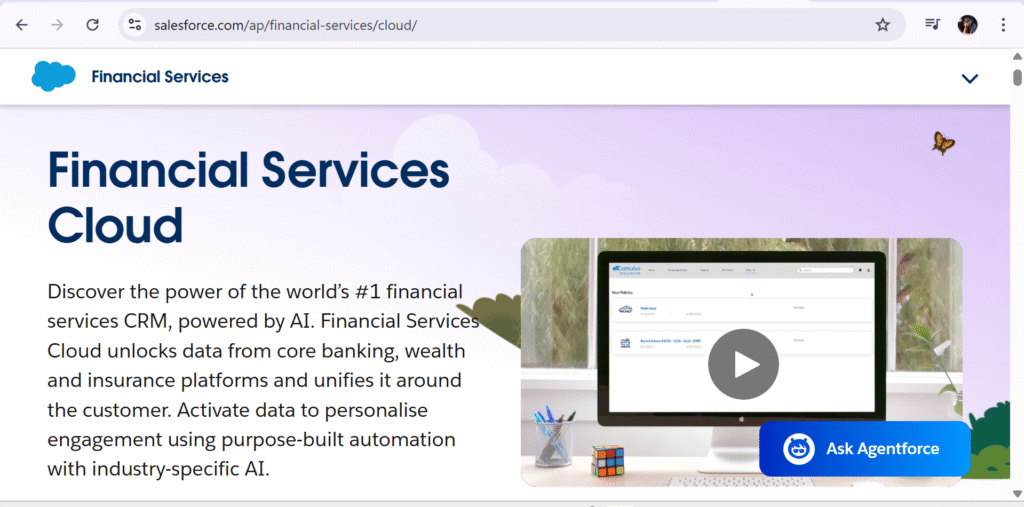
Overview
Salesforce Financial Services Cloud is a dedicated CRM built specifically for the needs of financial advisors, wealth managers, insurance professionals, and banking teams. Known for its industry-leading capabilities and advanced client relationship mapping, Salesforce offers a fully customized ecosystem for managing client households, investment history, financial goals, and regulatory requirements. Its AI-powered insights and world-class integrations make it one of the most powerful CRMs available in 2025.
Key Features
- Financial householding for full client profiles
- AI-driven recommendations via Einstein Analytics
- Automated compliance workflows
- Document tracking for audits and regulations
- Seamless integrations with wealth, portfolio, and insurance tools
Review
Salesforce Financial Services Cloud stands out because it is built specifically for the financial sector rather than being a general CRM. Its dashboards are highly intuitive and designed around financial workflows, making it easy to track client portfolios, communication timelines, and risk assessments. The automation significantly reduce administrative work, while the AI engine delivers actionable insights. Its only drawback is its cost, but for institutions seeking performance, it remains a top-tier choice.
Pros
- Purpose-built for financial professionals
- Excellent automation and AI forecasting
- Unmatched ecosystem and app marketplace
- Strong compliance and documentation features
Cons
- High pricing
- Can feel overwhelming for beginners
Final Verdict
Salesforce Financial Services Cloud is perfect for financial firms that need a specialized CRM with advanced industry tools. It delivers exceptional insights, streamlined workflows, and a highly professional ecosystem that strengthens every stage of the client relationship.
3. Redtail CRM
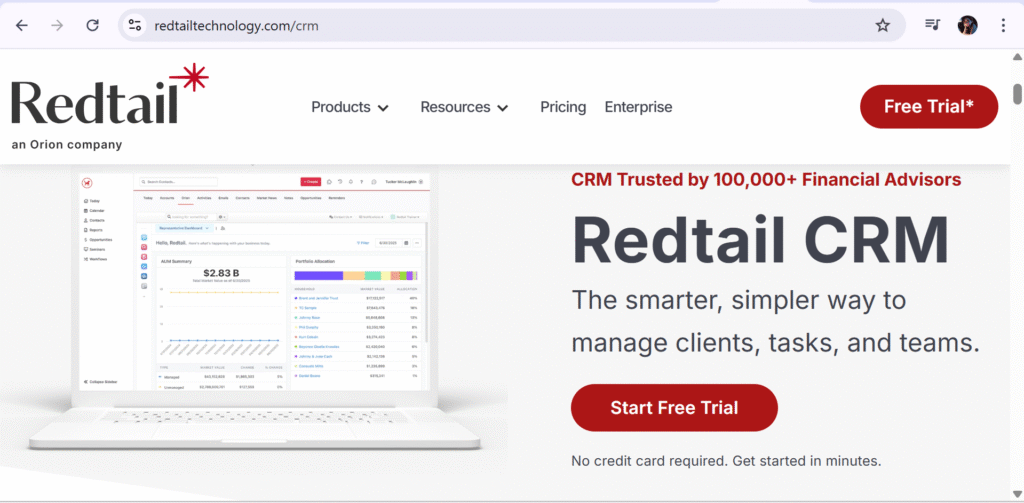
Overview
Redtail CRM is one of the most widely used CRMs among financial advisors due to its simplicity, affordability, and advisor-focused features. It offers a clean interface, fast navigation, and smart tools designed specifically for managing client interactions, compliance notes, and financial planning communications. The Redtail CRM service for finance also integrates seamlessly with major financial software, making it a reliable solution for independent advisors and small-to-mid-sized firms.
Key Features
- Simple and intuitive client management
- Automated reminders and workflow templates
- Compliance-ready notes and audit tracking
- Integrations with major financial planning tools
- Cloud-based access for remote teams
Review
Redtail CRM is known for bringing efficiency to advisory teams without overwhelming them with complexity. Its compliance tools are particularly strong—every client interaction can be documented and archived, helping advisors stay audit-ready. While it lacks the advanced AI and automation found in platforms like Salesforce, it shines in practicality, speed, and streamlined workflow operations. It is designed to be “advisor-friendly,” and it delivers exactly that.
Pros
- Very easy to learn and use
- Affordable pricing
- Strong compliance and documentation tools
- Great integrations for financial advisors
Cons
- Less customization than enterprise CRMs
- Limited advanced analytics
Final Verdict
Redtail CRM is the ideal choice for independent advisors and small firms who want a simple, effective, and compliance-focused CRM that handles all essential tasks without unnecessary complications.
4. Wealthbox CRM
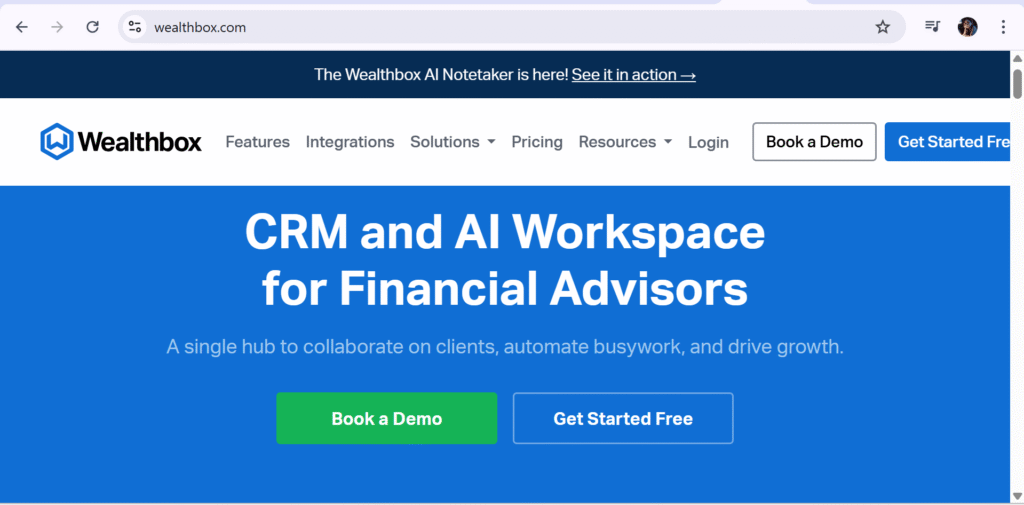
Overview
Wealthbox CRM is a modern, beautifully designed CRM created for financial advisors who value simplicity, speed, and team collaboration. Its social-media-style interface makes it incredibly easy to navigate, while its powerful automation tools support client tracking, task management, and workflow coordination. The Wealthbox CRM of financial services is particularly popular among small to mid-sized advisory firms who want advanced features without the heavy complexity of enterprise CRMs.
Key Features
- Clean, intuitive dashboard and interface
- Workflow automation and timeline tracking
- Collaboration tools for teams
- Integrations with custodians and portfolio systems
- Cloud-based and mobile friendly
Review
Wealthbox is loved for its user-friendly experience—advisors can adopt it with almost no training. It offers a great balance between simplicity and power, providing robust workflow features without overwhelming the user. Its integrations with financial custodians and portfolio platforms make it suitable for real-world advisory tasks. Although it may not offer as many deep analytics as Microsoft Dynamics or Salesforce, its ease of use and practicality make it a strong contender.
Pros
- Beautiful and intuitive interface
- Easy adoption with minimal training
- Strong teamwork and collaboration features
- Reliable integrations for financial advisors
Cons
- Not ideal for very large institutions
- Limited advanced analytics
Final Verdict
Wealthbox CRM is perfect for advisors and financial teams who want a lightweight, fast, and modern CRM that improves daily operations without complexity. It’s one of the best user-friendly CRMs on the market.
5. Junxure
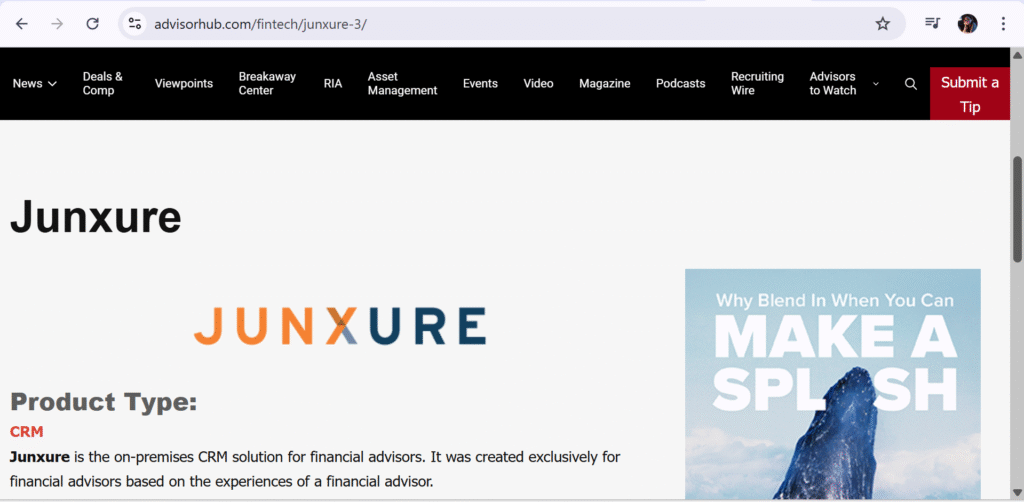
Overview
Junxure—now part of AdvisorEngine—is a powerful CRM created specifically for financial advisors who need robust workflow automation, deep client insights, and strong compliance management. Designed to support the daily operations of advisory firms, Junxure offers highly customizable workflows, advanced reporting, and detailed documentation tools that help firms stay audit-ready and organized. It is ideal for firms that need structure and operational discipline built directly into their CRM.
Key Features
- Advanced workflow automation tools
- Strong compliance and documentation system
- Customizable client profiles and tracking
- Reporting and audit-ready data storage
- Integrations with major advisory platforms
Review
Junxure stands out due to its workflow capabilities, which allow advisory firms to create detailed, step-by-step processes for onboarding, planning, annual reviews, and compliance. Its documentation tools are superb, making it one of the most reliable CRMs for regulatory-heavy environments. The interface of this CRM is slightly more complex compared to simple CRMs like Wealthbox, but its functional depth makes it a favorite among mid-sized advisory firms.
Pros
- Excellent workflow automation
- Strong compliance documentation
- Highly customizable processes
- Great reporting and data management
Cons
- Slightly dated interface
- Requires proper onboarding and training
Final Verdict
Junxure is a strong, process-driven CRM ideal for advisory firms that prioritize compliance, structure, and operational consistency. It’s not flashy, but it is extremely powerful and dependable for long-term practice management.
6. Zoho CRM
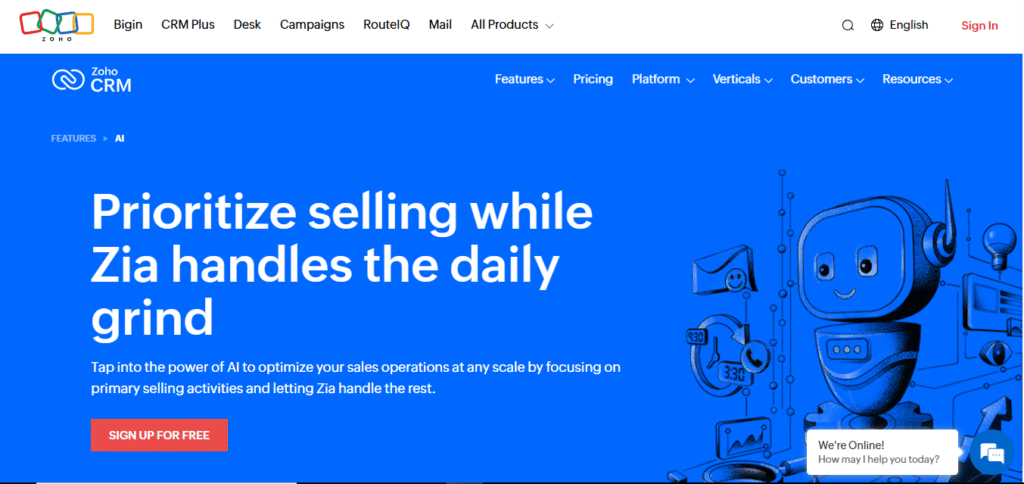
Overview
Zoho CRM is a versatile customer relationship management platform widely used in financial services due to its affordability, customizability, and strong automation capabilities. It provides a unified workspace for managing client interactions, tracking leads, monitoring pipelines, and maintaining compliance-friendly records. Its ecosystem integrates seamlessly with Zoho Books, Zoho Forms, and third-party apps, making it a flexible choice for both small advisory firms and mid-sized financial institutions seeking a powerful yet cost-effective CRM.
Key Features
- Lead and deal management
- Workflow automation
- Omnichannel communication
- Custom dashboards and reporting
- Strong integrations (Zoho + third-party apps)
Review
Zoho CRM performs exceptionally well for firms that want a scalable, configurable system without enterprise-level pricing. Its automation engine significantly reduces repetitive work, letting advisors spend more time on client engagement. While the interface is modern and responsive, new users may need some time to understand advanced customization settings. Its compliance tools are basic compared to dedicated financial CRMs, but integrations solve most gaps.
Pros
- Highly affordable with scalable plans
- Easy customization for financial workflows
- Large ecosystem of apps and extensions
-
Strong automation and analytics
Cons
- Compliance tools not as advanced as industry-specific CRMs
-
Setup for complex workflows may require technical support
Final Verdict
Zoho CRM is ideal for financial service teams wanting a powerful, flexible CRM at a reasonable price. Its automation features and integration ecosystem make it suitable for firms looking to streamline operations, improve client engagement, and scale efficiently.
7. HubSpot CRM
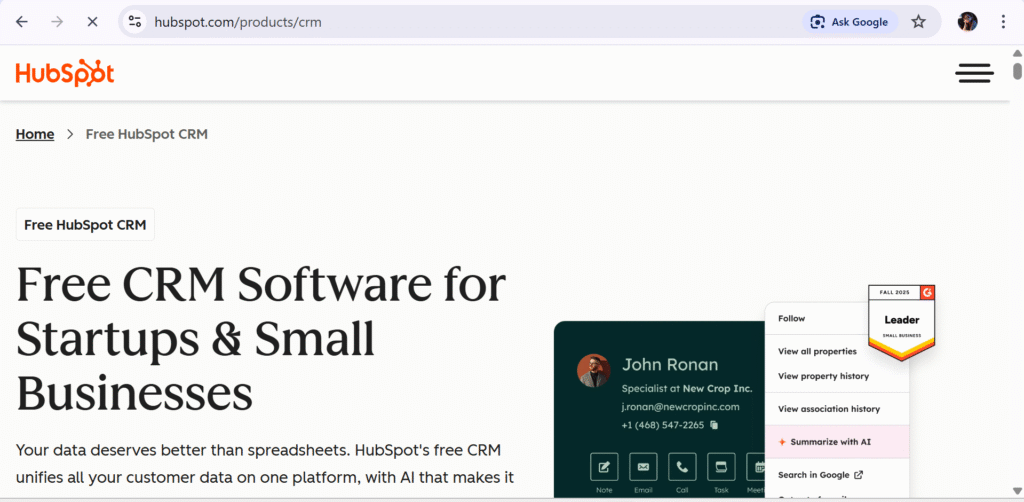
Overview
HubSpot CRM is a popular, user-friendly platform favored by financial advisors and firms looking for simplicity combined with powerful marketing, sales, and client-engagement tools. Its standout feature is the completely free core CRM, which includes essential contact management, interaction tracking, and email tools. For financial institutions focused on nurturing client relationships, HubSpot provides a polished interface and a robust suite of tools. Its integrated marketing hub also helps advisors build credibility through content, email drip campaigns, and conversions.
Key Features
- Free CRM with unlimited contacts
- Email tracking & meeting scheduling
- Sales pipelines with automation
- Marketing automation tools
- Client activity timelines
Review
HubSpot excels in ease of use, clean design, and powerful automation workflows that help financial advisors maintain consistent communication with prospects. Its marketing hub is a major advantage for wealth managers and insurance agents, allowing them to run targeted campaigns and track ROI. not built exclusively for financial services, its overall functionality and automation capabilities make it a strong choice for firms wanting modern digital engagement tools.
Pros
- Free version is highly capable
- Excellent marketing tools
- Advanced automation for lead nurturing
- Very easy to use and onboard teams
Cons
- Premium plans can become expensive
- Not built specifically for financial compliance
Final Verdict
HubSpot CRM is perfect for advisory firms prioritizing marketing-driven growth. Its automation and engagement tools elevate client communication, while the free plan makes it an excellent starting point for small and medium financial firms.
8. AdvisorEngine CRM
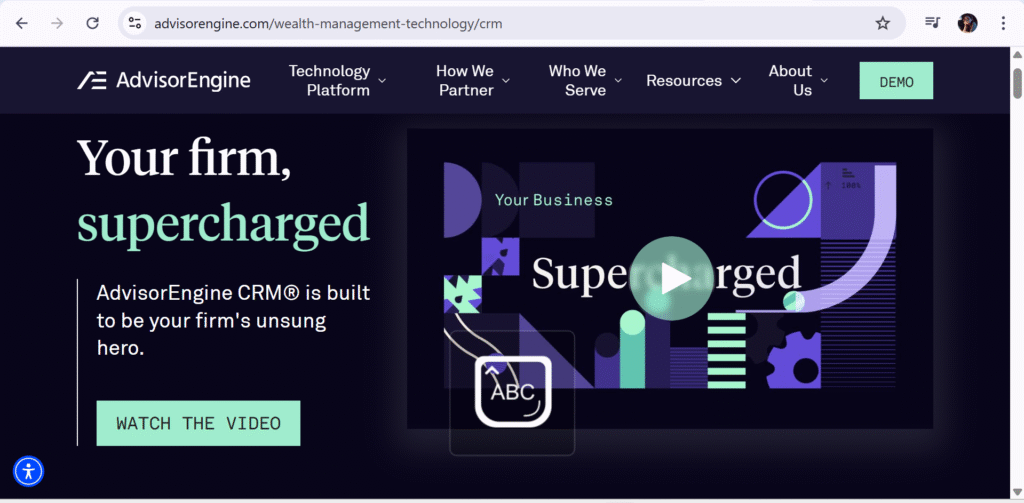
Overview
AdvisorEngine CRM—previously known as Junxure—is a CRM built exclusively for financial advisors and wealth management firms. It focuses heavily on compliance, advisor workflows, and client lifecycle management. With deep industry-specific tools, it helps advisors manage client profiles, financial planning tasks.It is especially strong for RIAs and financial planners who need detailed reporting, compliance documentation, and workflow automation aligned with regulatory requirements. Its purpose-built design ensures every feature fits the financial advisory.
Key Features
- Compliance-friendly workflows
- Document and audit trail management
- Advanced client segmentation
- Workflow automation
-
Reporting & client history tracking
Review
AdvisorEngine CRM shines in areas where general CRMs fall short—particularly compliance management, audit trails, and advisor-specific workflows. It enables financial firms to maintain records that align well with regulatory standards such as SEC and FINRA. Its interface is comprehensive, though slightly more traditional. It offers exceptional reporting tools and detailed client profiles.However, it requires onboarding time and is best suited for firms already familiar with structured advisory processes.
Pros
- Built specifically for wealth managers
- Strong compliance and audit capabilities
- Advanced workflow automation
-
Excellent long-term client lifecycle management
Cons
- Interface feels less modern
-
Requires time to learn and set up
Final Verdict
AdvisorEngine CRM is one of the best options for wealth management firms requiring strict compliance support, deep client tracking, and advanced workflows. For RIAs, it is a near-perfect fit.
9. Pardot by Salesforce
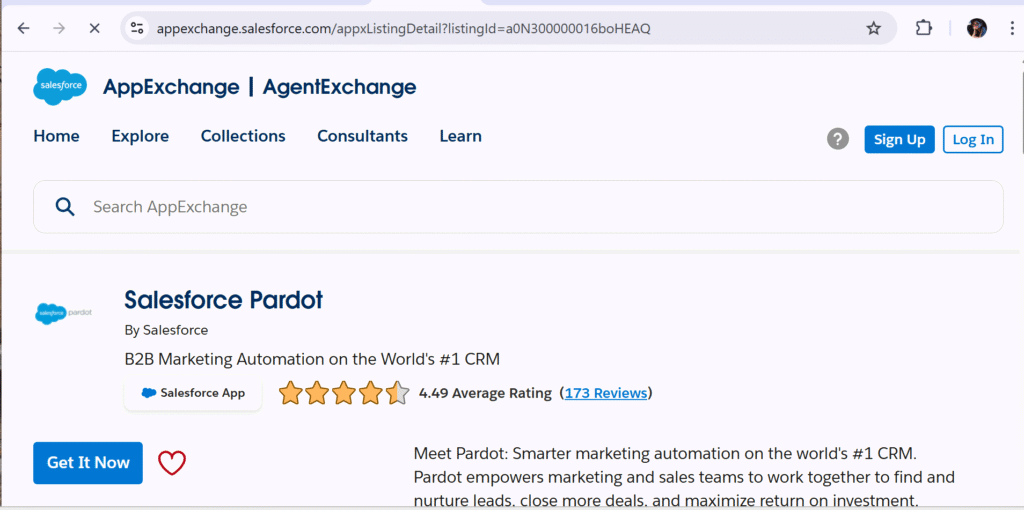
Overview
Pardot by Salesforce is a powerful B2B marketing automation platform widely used in financial services for lead nurturing, client engagement, and relationship-building campaigns. Though not a full CRM by itself, Pardot integrates directly with Salesforce Financial Cloud, giving wealth advisors, fintech firms, insurance brokers, and loan officers a unified marketing + CRM ecosystem. It helps firms automate email sequences, track client interest, score leads, and convert prospects more efficiently.
Key Features
- Advanced email automation
- Lead scoring and segmentation
- Salesforce integration
- Landing pages & campaign tracking
-
Detailed analytics dashboards
Review
Pardot excels at helping financial firms automate personalized communication with clients. Its lead scoring models help advisors identify high-intent prospects, while automation workflows handle nurturing at scale. Because of its deep Salesforce integration, firms benefit from a unified data environment where marketing and sales teams work seamlessly. However, Pardot is best suited for mid to large organizations due to its cost and complexity.
Pros
- Excellent automation capabilities
- Tight integration with Salesforce
- Strong analytics and tracking
- Ideal for large-scale lead nurturing
Cons
- Higher price point
-
Requires technical skills to manage
Final Verdict
Pardot is ideal for financial institutions that rely heavily on automated lead nurturing and want a robust marketing engine connected directly to Salesforce. It’s best for firms aiming to scale digital outreach.
10. BusinessNext CRM
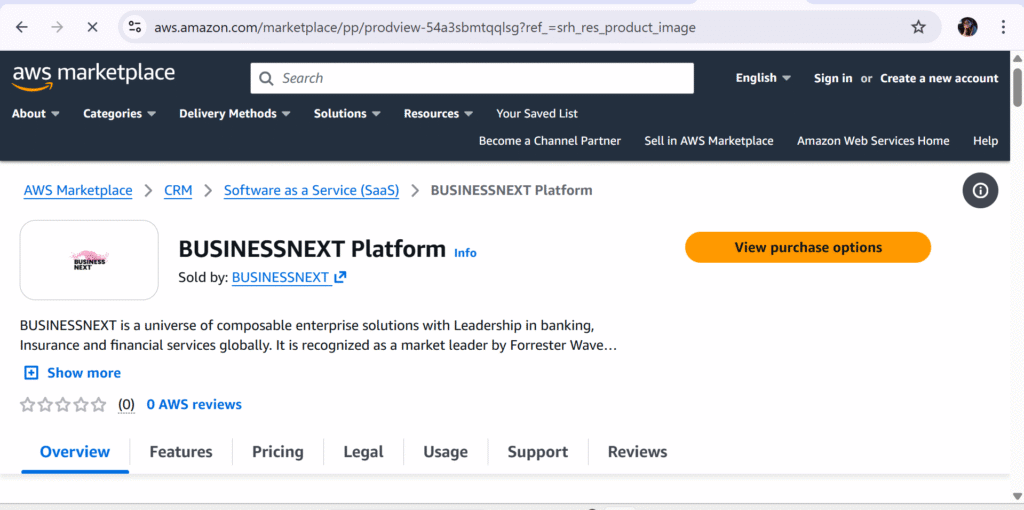
Overview
BusinessNext CRM (formerly CRMNEXT) is a highly specialized customer relationship management platform designed specifically for banks, insurance companies, wealth management firms, and other financial institutions. Known for its deep industry expertise, BusinessNext focuses on helping financial companies streamline customer onboarding, strengthen relationship management, manage compliance-heavy workflows, and deliver personalized financial products. What makes it stand out is its ability to automate end-to-end customer journeys.
Key Features
- AI-driven insights for customer engagement
- Smart lead distribution and automated onboarding
- Advanced compliance workflows (KYC, AML, regulatory reporting)
- 360-degree customer financial profile
- Seamless integration with banking, insurance & investment platforms
Pros
- Built specifically for financial services, not general businesses
- Excellent automation and workflow management
- Strong compliance and risk-control features
- AI and analytics provide deep client insights
Cons
- Pricing is not publicly available (custom enterprise quotes only)
- Can be complex to set up without technical assistance
Review
BusinessNext CRM excels in environments where financial regulations, complex workflows, and high-volume client data require a sophisticated and highly secure CRM system. Its strength lies in automating complicated financial processes—such as KYC verification, loan processing, wealth portfolio tracking, and insurance lifecycle management. Compared to general CRMs, BusinessNext understands the unique nature of financial services, providing unmatched depth.
Final Verdict
BusinessNext CRM is one of the most powerful and finance-specific CRM solutions available today. With its top-tier automation, regulatory compliance tools, and AI-driven customer journey management, it is an excellent choice for banks, insurance firms and wealth managers.
Conclusion
Choosing the best CRM for financial services is no longer just an operational decision—it’s a strategic move that defines how well your firm attracts clients, builds trust, stays compliant, and scales sustainably. Whether you’re a wealth advisor managing multi-million-dollar portfolios, a small RIA competing with larger institutions, or a financial consultant aiming to automate client relationships, the right CRM becomes your competitive edge.
Each platform in this list has been carefully selected based on authentic industry relevance, regulatory alignment, workflow strength, automation depth, and user feedback. From industry-specific solutions like Redtail, Wealthbox, Junxure, and AdvisorEngine, to all-in-one powerhouses like Salesforce and Microsoft Dynamics 365, to accessible and flexible platforms like Zoho and HubSpot, every CRM offers a unique advantage tailored to different financial service needs.
Ultimately, the ideal CRM is the one that matches your firm’s workflow, compliance requirements, client volume, automation goals, and long-term growth strategy. By choosing thoughtfully today, you equip your financial practice with the systems necessary to deliver exceptional client experiences, maintain transparency, scale efficiently, and elevate your advisory success in 2025 and beyond.
Frequently Asked Questions (FAQs)
What makes a CRM suitable for financial services specifically?
A financial-services-ready CRM includes features built around compliance, audit trails, client segmentation, document management, financial planning workflows, and secure communication. These features ensure advisors stay aligned with regulations like SEC and FINRA while maintaining transparent client relationships. The system must also support long lifecycle management, recurring reviews, and confidential data handling—requirements unique to the finance industry.
Is it better to use a general CRM or a finance-specific CRM?
General CRMs like Salesforce, Zoho, and HubSpot offer broad flexibility, powerful automation, and vast integrations, making them excellent for firms focused on marketing and scalability. However, finance-specific CRMs such as Redtail, Wealthbox, or AdvisorEngine provide built-in compliance tools, advisor workflows, and portfolio-centric features that reduce customization time. The best choice depends on whether you prioritize industry precision or customizable flexibility.
How much does a financial services CRM typically cost?
The cost varies widely depending on whether you choose an enterprise-level CRM or a lightweight solution. Finance-specific CRMs usually start around $40–$100 per user/month, offering built-in workflows tailored to advisors. Larger platforms like Salesforce or Microsoft Dynamics can range from $150–$300 per user/month, depending on the modules you need. More affordable CRMs like Zoho or HubSpot range from free to $60/month, making them ideal for smaller firms or startups.
Can financial CRMs help with compliance and regulation?
Yes—many CRMs designed specifically for financial services include tools for compliance tracking, audit logs, secure document storage, activity history, notes, and client communication records. Platforms like AdvisorEngine, Redtail, and Junxure excel in this category. Even general CRMs can be compliance-ready if you integrate add-ons, encryption tools, and structured workflows. The key benefit is maintaining a complete, traceable client history for audits and regulatory checks.
How do I choose the best CRM for my financial advisory firm?
Start by assessing your firm’s size, compliance needs, workflow type (sales-driven, relationship-based, or portfolio-focused), and growth goals. If you need strict regulatory alignment, choose an industry-specific platform like Wealthbox, Junxure, or Redtail. If marketing automation and scalability matter more, look at HubSpot, Salesforce, or Zoho. Also consider budget, integrations with existing tools (like portfolio software), and ease of use. A trial demo always helps finalize your decision.
